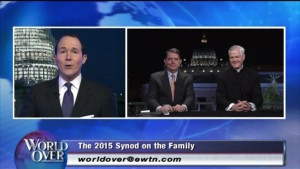I am here in Rome (with TCT’s editor-in-chief, Robert Royal) observing the Synod on the Family and providing commentary on various Catholic radio and television outlets. Much of the “media action” has occurred outside of the Synod Hall, which is to be expected given the decision not to publish summaries of the interventions by the individual Synod Fathers. Instead, the Holy See’s press briefings describe various statements made at the Synod without identifying who said what. This means that Synod Fathers who choose to speak to the media on the record are the only attributable guides as to what is going on, at least as far as they are concerned.
Archbishop Mark Coleridge of Brisbane, Australia gave an extensive interview to the National Catholic Reporter. He frankly admits that he is troubled by the uncertainty of the synodal procedures being used this time, and says that the Instrumentum Laboris is “weak” and “not a strong and rich enough document to sustain the entire work of the synod.” Most other bishops have said the same.
Archbishop Coleridge forecasts where the Synod will go on the burning questions raised at the 2014 Synod: “I don’t think the synod is going to reject what is regarded as fundamental Church teaching, by which I mean the untouchable trinity of marriage, Eucharist, and Church. Because if you touch one of those three, you touch them all. This is not marginal stuff. It is fundamentally important.” This is reassuring, but at the same time jarring, given that it would even be thought possible that a gathering of Catholic bishops would be interested in touching or rejecting “fundamental Church teaching.”
Archbishop Coleridge continues: “This is not going to happen, but I also think it’s unthinkable that all we do at the end of this synod process is simply say and do what we have long said and done in the area of marriage and the family.” He adds: “in many parts of the world we know that the language we speak is not communicating and we know that the ways in which we have acted are not touching the lives of many people and, in fact, are proving to be deeply alienating in the lives of many people who need help.”
The argument here is disturbing in several ways. The clear and confident restatement of what the Church has always taught about marriage and family would be the most welcome and refreshing outcome of the Synod, given the relentlessly hostile cultural context in which we live, and the uncertainties experienced by the faithful following the publication of last year’s notorious Interim Report. The endorsement by various influential churchmen of Cardinal Walter Kasper’s proposal to allow divorced and civilly remarried Catholics to receive the Holy Eucharist has left many with the impression that the Church is not comfortable continuing to teach what she has always taught about adultery and indissolubility.

The parallel campaign in favor of granting some recognition of the supposed value in homosexual relationships has likewise caused scandal by equating marriage with a union based on the mortal sin of sodomy. To restate what the Church has always taught is no unnecessary or merely repetitive exercise. Rather, it is truly prophetic, and a timely call to renew our faith in God’s saving plan for man and woman.
As to the effectiveness of the language of Church teaching (“the language we speak is not communicating”), some distinctions need to be made. Communication is ineffective when the words are not understood by the listener. Communication is effective when the words are understood, even if the listener rejects the truth of the message. As regards the moral doctrine of the Church, the problem for many today is not unintelligibility, i.e, they cannot figure out what the Church teaches. Rather, that doctrine is understood quite well – and rejected.
That is not a failure to communicate, but rather a successful imparting of unwelcome knowledge. The Church’s mission is to call sinners to repentance, which starts with proclaiming the truths of the Gospel, however contrary they are to the lifestyle choices of those who hear that proclamation. Our absolute certainty in the truth of the Church’s doctrine and our belief in the efficacy of Divine grace teach us that the anger or sadness produced in a person being challenged to live according to God’s plan is salutary – and in many ways necessary.
Archbishop Coleridge claims not only that the language is not communicating, but that it is “deeply alienating in the lives of many people who need help.” Here we come to the crucial question of what is being rejected by the alienated people who need help: are they rejecting a heretofore unrecognized misrepresentation of what Christ really said about marriage and sexual morality, which misrepresentation is found in the magisterium of St. John Paul II and Benedict XVI? This can hardly be the case.
The Church’s teaching, as recently proclaimed by these popes, in clear language that is universally recognized as faithful to the Scriptures and to the Deposit of Faith, is not guilty of alienating people, who are being kept away from Christ by deficient language. Sin is what alienates. The language of Familiaris Consortio and of the Catechism of the Catholic Church does not require modification. What is needed is the clear recognition that the sadness produced by sin (i.e., alienation) clouds the mind (spiritual blindness) and leads men to rebel against God’s plan for human fulfillment.
The wording of Church teaching can, perhaps, be improved when it is fails to accurately and confidently convey the beauty and truth of the Word of God. I submit that no such failure can be fairly ascribed to what the Church has repeatedly taught about God’s plan for marriage and the family. Her unapologetic restatement of that teaching at the Synod would be a clarion call to embrace that plan.
Therein lies the true remedy to alienation from God and the Church.















